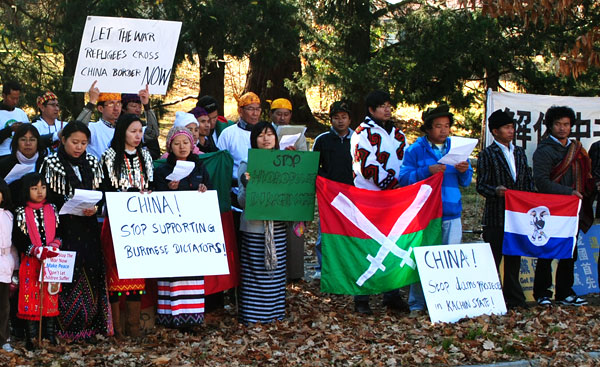Kachins in Australia on June 24 demanded a stop to the war and abuse of people in Kachin State. They also called on China to stop supporting the Burmese government, which is being backed by the notorious military regime.
About 60 Kachin people in Australia from Melbourne, Sydney and Brisbane participated in the demonstrations in front of the Burmese and Chinese Embassies in Canberra.
The Kachin Association Australia (KAA) has sent a letter to Burmese Embassy demanding Burmese troops halt the military offensive and to initiate peaceful negotiations, and drew the world’s attention to Kachin ethnic affairs, demanded withdrawal of Burmese troops from Kachin State and told all Kachin around the world to wish the same for the people in the Kachin homeland.
They also demanded to the Chinese Embassy in a letter to stop business dealings and supporting the Burmese government. It also urged China to stop constructing hydropower plants and allow war refugees to cross the China border for shelter.
The civil war started on June 9 between the Kachin Independence Army (KIA) and the Burmese Army after 17 years of a ceasefire agreement signed in 1994.
There are more than 20,000 Kachin ethnic war refugees, who have fled to the China border fearing torture, abuse, rape and use as porters by Burmese troops. They are living without any aid.
Refugees, who fled to Laiza headquarters of KIA told KNG they are fleeing fearing being used as porters by Burmese government troops on the front line of the war zone more than any other reason.
KIA officials said thousands of war refugees need immediate aid and there is no organization or international aid agency on the spot.
KIA is distributing two cans of rice to each refugee each day and a locally based NGO is providing health care. But the KIA cannot support the refugees for a long period of time for they have their own struggle with continuous attacks by the Burmese Army.


